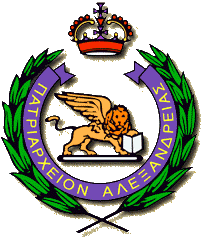Difference between revisions of "Church of Alexandria"
m (→External links: fr) |
m |
||
| Line 1: | Line 1: | ||
The '''Church of Alexandria''' is one of the [[autocephaly|autocephalous]] [[Orthodox Church]]es. Its [[primate]] is the Pope and Patriarch of Alexandria and All Africa, the successor to the [[Apostle Mark|Apostle Mark the Evangelist]], who founded the Church of Alexandria in the 1st century. It is one of the five ancient [[patriarchate]]s of the early [[Church]], called the ''[[Pentarchy]]''. | The '''Church of Alexandria''' is one of the [[autocephaly|autocephalous]] [[Orthodox Church]]es. Its [[primate]] is the Pope and Patriarch of Alexandria and All Africa, the successor to the [[Apostle Mark|Apostle Mark the Evangelist]], who founded the Church of Alexandria in the 1st century. It is one of the five ancient [[patriarchate]]s of the early [[Church]], called the ''[[Pentarchy]]''. | ||
| − | |||
{{church| | {{church| | ||
Revision as of 23:01, July 23, 2008
The Church of Alexandria is one of the autocephalous Orthodox Churches. Its primate is the Pope and Patriarch of Alexandria and All Africa, the successor to the Apostle Mark the Evangelist, who founded the Church of Alexandria in the 1st century. It is one of the five ancient patriarchates of the early Church, called the Pentarchy.
| Greek Orthodox Patriarchate of Alexandria and All Africa | |
| Founder(s) | Apostle Mark |
| Autocephaly/Autonomy declared | Traditional |
| Autocephaly/Autonomy recognized | Traditional |
| Current primate | Pope Theodoros II |
| Headquarters | Alexandria, Egypt |
| Primary territory | Egypt and Africa |
| Possessions abroad | ? |
| Liturgical language(s) | Greek, Swahili, English, local languages |
| Musical tradition | Byzantine Chant |
| Calendar | Revised Julian |
| Population estimate | 250,000 |
| Official website | Church of Alexandria |
Contents
History
Since the schism occurring as a result of the political and Christological controversies at the Council of Chalcedon (451 A.D.), the portion of the Church of Alexandria loyal to Chalcedonian Christology has liturgically been Greek-speaking, the majority of its native (i.e., Coptic) population and their modern descendents becoming a part of the Coptic Orthodox Church (i.e., non-Chalcedonian).
The Church today
In recent years, a considerable missionary effort was enacted by Pope Petros VII. During his seven years as patriarch (1997-2004), he worked tirelessly to spread the Orthodox Christian faith in Arab nations and throughout Africa, raising up native clergy and encouraging the use of local languages in the liturgical life of the Church. Missions spread and thrived in Kenya, Uganda, Madagascar, Cameroon, and elsewhere across the African continent.
Particularly sensitive to the nature of Christian expansion into Muslim countries, His Beatitude worked to promote mutual understanding and respect between Orthodox Christians and Muslims. His efforts were ended as the result of a helicopter crash on September 11, 2004, in the Aegean Sea near Greece, killing him and several other clergy, including Bishop Nektarios of Madagascar, another bishop with a profound missionary vision.
Today, some 300,000 Orthodox Christians comprise the Patriarchate of Alexandria, the highest number since the Roman Empire. The current primate of the Church of Alexandria is His Beatitude Theodoros II, Pope and Patriarch of Alexandria and All Africa.
The Episcopacy
The Holy Synod
- His Beatitude Theodoros II, Pope and Patriarch of Alexandria and all Africa
- His Eminence Paul (Lyngris), Metropolitan of Memphis
- His Eminence Dionysios (Hatzivasiliou), Metropolitan of Leontopolis
- His Eminence Petros (Giakoumelos), Metropolitan of Axum
- His Eminence Makarios (Tyliirides), Metropolitan of Kenya
- His Eminence Ionas, Metropolitan of Kampala and all Uganda
- His Eminence Seraphim (Iakovou), Metropolitan of Johannesburg and Pretoria
- His Eminence Alexander (Gianniris), Metropolitan of Nigeria
- His Eminence Theophylaktos (Tzoumerkas), Metropolitan of Tripolis
- His Eminence Sergios, Metropolitan of the Cape of Good Hope
- His Eminence Alexios, Metropolitan of Carthage
- His Eminence Kallinikos (Pippas), Metropolitan of Pelusion
- His Eminence Proterios (Pavlopoulos), Metropolitan of Ptolemais
- His Eminence George (Vladimirou), Metropolitan of Zimbabwe
- His Eminence Nikolaos, Metropolitan of Hermopolis
- His Eminence Dimitrios (Zaharengas), Metropolitan of Irinoupolis
- His Eminence Ignatios (Madenlides), Metropolitan of Central Africa
- His Eminence Emmanuel, Metropolitan of Khartoum and all Sudan
- His Eminence Gregorios, Metropolitan of Cameroon
Diocesan Bishops
- His Grace Ieronymos, Bishop of Bukoba
- His Grace Ioakim (Kontobas), Bishop of Zambia
- His Grace Damaskinos, Bishop of Ghana
- His Grace Ignatios, Bishop of Madagascar
- His Grace Meletios, Bishop of Kolwezi
- His Grace Theodoros, Bishop of Mozambique
Auxiliary Bishops
- His Grace Athanasios of Cyrene
- His Grace Gabriel of Mareotis
- His Grace Spyridon of Kanopou
- His Grace Nikodemos of Nitria
- His Grace Gennadios of Nilopolis
Retired Bishops
- His Grace Theoklitos of Helioupolis
- His Grace Philemon of Karvasos
- His Grace Ioakeim of Tamiathus
- His Grace Porfyrios of Thivais
- His Grace Panteleimon of Antinoe
- His Grace Kyrillos of Nafkratis
- His Grace Petros of Nikopolis
See also
External links
- The Patriarchate of Alexandria (Official site)
- Archbishopric of Johannesburg and Pretoria
- List of Patriarchs
- History of the Patriarchate
- Eastern Christian Churches: Patriarchate of Alexandria by Ronald Roberson, a Roman Catholic priest and scholar
| Autocephalous and Autonomous Churches of Orthodoxy |
| Autocephalous Churches |
| Four Ancient Patriarchates: Constantinople · Alexandria · Antioch · Jerusalem Russia · Serbia · Romania · Bulgaria · Georgia · Cyprus · Greece · Poland · Albania · Czech Lands and Slovakia · OCA* · Ukraine* |
| Autonomous Churches |
| Sinai · Finland · Estonia* · Japan* · China* · Ukraine* |
| The * designates a church whose autocephaly or autonomy is not universally recognized. |
